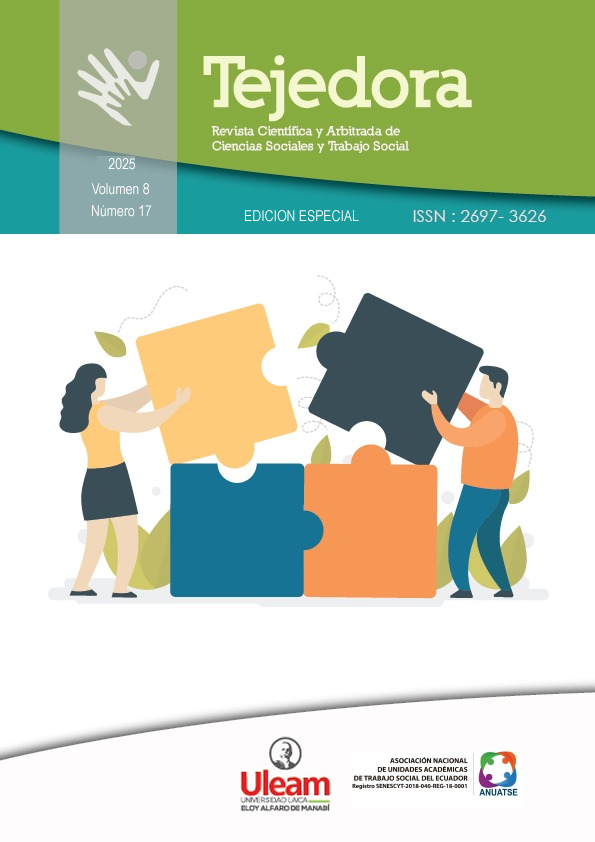CORPORATE SOCIAL RESPONSIBILITY IN COMMUNITY DEVELOPMENT
DOI:
https://doi.org/10.56124/tj.v8i19.036Keywords:
Community development, corporate social responsibility, social workAbstract
The analysis of the impact of the Deshidratados Churopinto project, implemented by Aglomerados Cotopaxi S.A. in the community of Santa Catalina de Churopinto, within the framework of Corporate Social Responsibility (CSR) applied to community development, begins with the recognition of CSR as a strategic component that, when aligned with social work, can generate profound transformations in territories marked by historical tensions between companies and communities. The research was conducted using a qualitative approach with an exploratory-descriptive design, incorporating interviews, focus groups, participant observation, and document review. Community workers, local leaders, and social work professionals directly involved in the project were interviewed. The findings show that CSR, when it includes genuine and sustained participatory processes, becomes a bridge for local empowerment, gender equity, and social sustainability. Notable outcomes include the strengthening of women’s leadership, job creation, the restoration of trust between the company and the community, and the valuing of dialogue as a tool for transformation. Social work played a key role as a strategic support that maintained both the connection and the legitimacy of the process. The conclusions indicate that the project represents a replicable CSR model with positive impact, although challenges remain regarding economic autonomy, the inclusion of broader population sectors, and the institutionalization of community participation within corporate policies. This study provides meaningful evidence on how collaboration between companies, communities, and social work professionals can become a driving force for sustainable development
Downloads
References
Aglomerados Cotopaxi. (2025). Informe de sostenibilidad empresarial. Aglomerados Cotopaxi S.A.
Carroll, A. B., & Brown, J. A. (2021). Corporate social responsibility: A review of current concepts, research, and issues. Journal of Business Ethics, 170(1), 1–18.
FAO. (2024). Estado de los bosques del mundo 2024. Organización de las Naciones Unidas para la Alimentación y la Agricultura.
Godínez-Reyes, G., & Alfaro-Calderón, D. (2022). Responsabilidad social empresarial en América Latina: avances, tensiones y perspectivas. Revista Latinoamericana de Administración, 58(2), 45–67.
Instituto Nacional de Estadística y Censos. (2023). Estadísticas de sostenibilidad y RSE en empresas ecuatorianas. INEC.
Idowu, S. O., & Schmidpeter, R. (2022). Corporate social responsibility in times of crisis: Practices and cases from Europe, Latin America, and Africa. Springer. https://doi.org/10.1007/978-3-030-94809-7
Llopis-Goig, R. (2020). Trabajo social y empresa: Tensiones, retos y posibilidades. Cuadernos de Trabajo Social, 33(2), 291–305. https://doi.org/10.5209/cuts.65722
Maldonado, R. (2024). Responsabilidad social y sostenibilidad en contextos vulnerables. Revista de Ciencias Sociales Aplicadas, 19(1), 28–41.
Martínez, C., & Durán, M. (2023). Liderazgo comunitario y participación ciudadana en zonas rurales. Revista Latinoamericana de Estudios Sociales, 10(1), 67–85.
Méndez, L. (2023). El desafío de la RSE en el sector forestal: implicaciones sociales y ambientales. Revista Ecuatoriana de Desarrollo Sustentable, 11(2), 90–105.
Ministerio del Ambiente. (2024). Gestión forestal y conflictos socioambientales. Gobierno del Ecuador.
Naciones Unidas. (2015). Transformar nuestro mundo: la Agenda 2030 para el Desarrollo Sostenible. ONU.
Ormaza, D., Salazar, J., & Pérez, V. (2023). Evolución del concepto de responsabilidad social empresarial en Ecuador. Revista Gestión Empresarial, 38(3), 55–71.
Pacto Global ONU. (2023). Reconocimiento ODS: prácticas empresariales sostenibles en Ecuador. Red Pacto Global Ecuador.
PNUD. (2023). Informe regional sobre desarrollo humano en América Latina. Programa de las Naciones Unidas para el Desarrollo.
Porter, M. E., & Kramer, M. R. (2019). Creating shared value. Harvard Business Review, 89(1/2), 62–77.
Putnam, R. D. (2020). Capital social y desarrollo comunitario. Cambridge University Press.
Revista Gestión. (2024). RSE en Ecuador: entre la filantropía y el compromiso estratégico. Gestión Revista Empresarial, 72(1), 30–35.
Revista Zona Libre. (2024). Educación ambiental y participación juvenil: experiencias desde el sector forestal. Zona Libre, 10(4), 18–22.
Rodríguez, A., & Vargas, L. (2021). Emprendimientos rurales liderados por mujeres: Implicaciones sociales y económicas. Revista de Estudios de Género, 14(3), 205–223.
Salguero, M., & Hidalgo, F. (2024). Prácticas de sostenibilidad empresarial con enfoque de género. Revista de Innovación Social y Ambiental, 5(1), 66–78.
Sánchez Riofrío, P. (2023). Políticas públicas y RSE en América Latina: una mirada crítica. Revista de Gobernanza y Desarrollo, 7(3), 101–117.
Sarmiento-Martínez, A. (2022). De la filantropía a la responsabilidad social estratégica: percepciones sociales en Ecuador. Estudios Organizacionales, 15(2), 88–102.
Tapia, G., & Coronado, R. (2022). Desafíos de la sostenibilidad de proyectos sociales con apoyo empresarial. Desarrollo y Sociedad, 88(2), 123–145.
UEES. (2023). Informe sobre prácticas de responsabilidad social empresarial en Ecuador. Universidad de Especialidades Espíritu Santo.
Viteri, A. (2010). Desarrollo sostenible y equidad en América Latina. Revista Andina de Estudios Sociales, 12(2), 77–92.
Published
How to Cite
Issue
Section
License
Copyright (c) 2025 Revista Científica y Arbitrada de Ciencias Sociales y Trabajo Social: Tejedora. ISSN: 2697-3626

This work is licensed under a Creative Commons Attribution-NonCommercial-ShareAlike 4.0 International License.






















